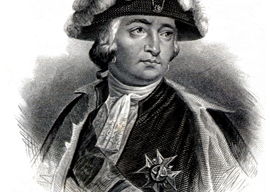
May 17, 2011

Duc d"Orléans aka Philippe Egalité
Thus, when a politician promises to look after the poor, few voters expect him to do so. Most politicians and voters couldn”t care less about the poor. But left-leaning voters won”t plug themselves into the loop until they hear the proper mantra. Whether the politician actually intends to help the poor is immaterial.
It would matter, however, if the politician announced that such mythical help would be financed by tax increases. The voter’s money is real life. So a politician will mollify the voter by promising to increase spending without increasing either the taxes or the money supply. The voter could then ask where the money is going to come from”especially if the economy is sluggish”but is unlikely to do so. He’s satisfied merely having heard the right noises. He’s ready to consent to be governed.
The difference between “right-wing” and “left-wing” politicians lies not in their actions, much less in their principles, but in the response they wish to elicit from the electorate. A voter leaning right will want a guarantee that his taxes won”t go up, and a politician seeking his vote will grab that opening with alacrity. The elder George Bush’s “Read my lips: no new taxes” was a good example of such marketing. Both the politician and his supporters knew that taxes would go up”they usually do. If the income-tax rate remains the same, some less visible taxes will make up the difference. One way or the other, the state will make us pay more because by doing so it”ll increase its power, and that’s all it craves.
A “conservative” politician is expected to make patriotic noises, whether it’s a commitment to defense (US), sovereignty (UK), anti-Americanism (France) or, implicitly, international dominance (Germany). The pitch of such noises has to be set right: too low, and the core market won”t buy; too high, and the appeal will be narrow. The winner will be a politician who finds the right words to claim, in the language of advertising media buyers, both coverage and depth. The winner will keep his core supporters” loyalty while appealing to a broader audience.
Modern politicians play the same amusing verbal tricks when they use egalitarian-sounding nicknames. It has to be Tony or Dave; names such as Anthony or David bespeak obtuse traditionalism. It’s as if Philippe Egalité reverted to Duc d”Orléans rather than progress to a more amenable Phil.
One needs a name that can go populist without sounding infantile. Had John Major been named Ronald, he”d probably still be prime minister. “Ron Major” sounds like a square-jawed warrior who”ll lay down his life for his neighbors. Not so “Johnny” Major, who could only be a wimp with a gold chain under his shirt. Likewise, George Bush Sr. probably lost to Bill Clinton partly because his name doesn”t lend itself to populism: “Georgie” Bush would be a polo-playing layabout, not the free world’s leader. His son won two elections, but only because he was known as a cozy “Dubya.” Both candidates in the last US election had irreducible names, so they had to build their brands in other ways.
It’s of such little games that modern politics are made. It’s we who are the big losers.